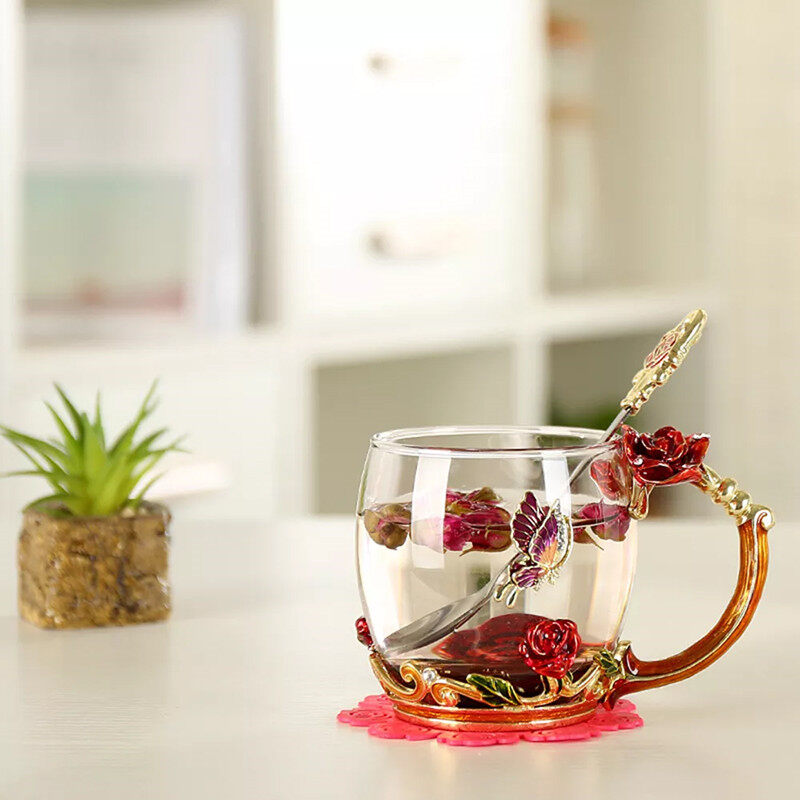Email cannot be empty
Password cannot be empty
checkout as a guest
or
Facebook
Google
Email format error
Email cannot be empty
Email already exists
6-20 characters(letters plus numbers only)
The password is inconsistent
Please enter the email address you’d like your password reset information sent to.
Email format error
Email cannot be empty
Email does not exist
Reset account password
For the account
6-20 characters(letters plus numbers only)
The password is inconsistent
Reset success
Your password was reset. You can log in using your new password.
Login

Feihong Glass/News

Glass vs. Ceramic Tea Cups: Which One Enhances Your Tea Experience?
2025-03-07 15:50:19
If you're anything like me, you've spent countless hours perfecting your tea-drinking ritual. From selecting the finest loose-leaf teas to brewing them at just the right temperature, every detail matters. But there's one question that often pops up: Should you sip your tea from a glass cup or a ceramic one? Let's dive into the world of tea cups and figure out which one truly enhances your tea experience.
The Glass Tea Cup: A Window into Your Brew
Glass tea cups are like the transparent heroes of the tea-drinking world. They let you see the beauty of your brew as it unfolds—watching the leaves dance and the color deepen is half the fun! Plus, glass is non-porous, which means it won't absorb any flavors or odors from previous brews. This is perfect for those who switch between different types of tea, from delicate greens to bold blacks.
Pros of Glass Tea Cups
-
Visual Appeal: Glass cups offer a clear view of your tea, allowing you to appreciate the color and clarity of your brew. This can be especially fun when you're experimenting with new teas or showcasing a beautiful infusion.
-
Flavor Preservation: Since glass is non-porous, it won't retain any lingering flavors or odors. This means your tea will always taste fresh and true to its original flavor profile.
-
Easy to Clean: Glass is easy to clean and doesn't require any special care. A quick rinse with warm water and a gentle scrub is usually all you need to keep it spotless.
-
Versatility: Glass cups are great for brewing a wide range of teas, from delicate herbal infusions to strong black teas. They also work well for iced tea, giving you a versatile option for all your tea needs.
Cons of Glass Tea Cups
-
Fragility: Glass is, well, glass. It can be prone to breaking if dropped or knocked over. This means you need to be a bit more careful when handling it, especially if you have kids or pets around.
-
Heat Retention: Glass doesn't retain heat as well as ceramic. This means your tea might cool down faster, which could be a downside if you like to savor your brew over a longer period.
-
Limited Insulation: Without proper insulation, glass cups can get quite hot to the touch. This might require you to use a coaster or handle with care to avoid burns.
The Ceramic Tea Cup: Warmth and Tradition
Ceramic tea cups have been a staple in tea culture for centuries. They offer a sense of warmth and tradition that glass simply can't match. Whether you're sipping tea in a cozy café or enjoying a quiet moment at home, ceramic cups feel right at home.
Pros of Ceramic Tea Cups
-
Heat Retention: Ceramic is excellent at retaining heat. This means your tea will stay warm longer, allowing you to enjoy it at the perfect temperature without having to constantly reheat it.
-
Insulation: Unlike glass, ceramic cups are less likely to burn your fingers. The material insulates well, keeping the exterior cool to the touch even when the tea inside is piping hot.
-
Aesthetic Variety: Ceramic cups come in a wide range of designs, from classic patterns to modern art. You can choose a cup that reflects your personal style or matches your tea set.
-
Durability: Ceramic is more durable than glass. It's less likely to break if dropped, making it a safer option for everyday use, especially in busy households.
Cons of Ceramic Tea Cups
-
Flavor Absorption: Ceramic is porous, which means it can absorb flavors and odors over time. This might affect the taste of your tea, especially if you use the same cup for different types of tea.
-
Cleaning: While ceramic cups are easy to clean, they may require more attention to remove stains or lingering flavors. Some people even recommend using separate cups for different types of tea to avoid cross-contamination.
-
Weight: Ceramic cups tend to be heavier than glass ones. This might not be a big deal, but if you prefer a lightweight drinking experience, glass might be a better choice.
Enhancing Your Tea Experience: Beyond the Material
While the choice between glass and ceramic tea cups largely depends on personal preference, there are a few other factors to consider when choosing the perfect cup for your tea ritual.
Size and Shape
The size and shape of your tea cup can significantly impact your drinking experience. A wide, shallow cup is perfect for delicate teas like white or green tea, allowing the aroma to waft up and the leaves to expand. On the other hand, a deeper cup might be better for stronger brews like black tea or herbal infusions.
Matching Your Tea Set
If you're a tea enthusiast, you probably have a collection of tea sets. Choosing a cup that matches your teapot or tea infuser can enhance the overall aesthetic of your tea-drinking ritual. Whether you prefer a minimalist design or something more ornate, finding a cup that complements your other tea accessories can make the experience even more enjoyable.
Personal Comfort
Tea drinking is all about comfort and enjoyment. Consider how the cup feels in your hand. Does it fit comfortably? Is it easy to hold? The right cup should feel like an extension of your hand, making it easy to sip and savor your tea.
The Final Verdict: Glass or Ceramic?
So, which one is better for enhancing your tea experience? The answer, as you might have guessed, depends on what you value most in your tea-drinking ritual.
If you prioritize visual appeal, flavor preservation, and ease of cleaning, a glass tea cup might be the perfect choice for you. It allows you to fully appreciate the beauty of your tea and ensures that each sip tastes just as it should.
On the other hand, if you prefer warmth, durability, and heat retention, ceramic is the way to go. Ceramic cups offer a cozy, traditional feel that can make your tea experience even more enjoyable, especially on a cold day.
Contact us

